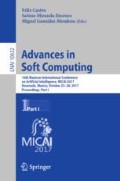Abstract
Extreme Learning Machine (ELM) is a model for the training of single-hidden feedforward networks and is used extensively in problems of classification and regression for its good results and reduced training time compared to backpropagation. Previous work has shown that to define randomly the input weights and biases of the hidden layer reduces quality (accuracy) of ELM. This paper makes a comparative study of three variants of harmony search (the original Harmony Search, Global-best Harmony Search, and New Global Harmony Search), a memetic algorithm from the state of the art denominated M-ELM and a random walk algorithm named RW-ELM on 20 classical classification datasets available in the UCI repository. The results show that the best algorithm for training ELMs is Harmony Search and that the other two variants of this algorithm are better than M-ELM and RW-ELM when cross-validation is used. The experiments were performed at first using separate archives for training and testing, then using cross-validation with 5 folders. Based on literature, authors recommend the use of cross-validation technique because more realistic accuracy results can be obtained.
Access this chapter
Tax calculation will be finalised at checkout
Purchases are for personal use only
References
Rumelhart, D.E., Hinton, G.E., Williams, R.J.: Learning representations by back-propagating errors. Nature 323, 533–536 (1986)
Huang, G.B., Zhu, Q.Y., Siew, C.K.: Extreme learning machine: theory and applications. Neurocomputing 70, 489–501 (2006)
van Heeswijk, M.: Advances in Extreme Learning Machines (2015). http://urn.fi/URN:ISBN:978-952-60-6149-8
Zhu, Q.Y., Qin, A.K., Suganthan, P.N., Huang, G.: Bin: evolutionary extreme learning machine. Pattern Recognit. 38, 1759–1763 (2005)
Han, F., Yao, H.F., Ling, Q.H.: An improved evolutionary extreme learning machine based on particle swarm optimization. Neurocomputing 116, 87–93 (2013)
Saraswathi, S., Sundaram, S., Sundararajan, N., Zimmermann, M., Nilsen-Hamilton, M.: ICGA-PSO-ELM approach for accurate multiclass cancer classification resulting in reduced gene sets in which genes encoding secreted proteins are highly represented. IEEE/ACM Trans. Comput. Biol. Bioinform. 8, 452–463 (2011)
Silva, D.N.G., Pacifico, L.D.S., Ludermir, T.B.: An evolutionary extreme learning machine based on group search optimization. In: 2011 IEEE Congress of Evolutionary Computation (CEC), pp. 574–580 (2011)
Cao, J., Lin, Z., Huang, G.: Bin: self-adaptive evolutionary extreme learning machine. Neural Process. Lett. 36, 285–305 (2012)
Valença, I., Valença, M.: Optimizing the extreme learning machine using harmony search for hydrologic time series forecasting. Intell. Data Eng. Autom. Learn. IDEAL 2012, 261–269 (2012)
Kong, H.: Evolving extreme learning machine paradigm with adaptive operator selection and parameter control. Int. J. Uncertain. Fuzziness Knowl. Base Syst. 21, 143–154 (2013)
Learning, A.E., Elm, M.: Evolutionary extreme learning machine based on particle swarm optimization and clustering strategies. In: Proceedings of the 2013 International Joint Conference Neural Networks, vol. 560, pp. 305–310 (2013)
Bazi, Y., Alajlan, N., Melgani, F., AlHichri, H., Malek, S., Yager, R.R.: Differential evolution extreme learning machine for the classification of hyperspectral images. IEEE Geosci. Remote Sens. Lett. 11, 1066–1070 (2014)
Dash, R., Dash, P.K., Bisoi, R.: A self adaptive differential harmony search based optimized extreme learning machine for financial time series prediction. Swarm Evol. Comput. 19, 25–42 (2014)
Liu, N., Wang, H., Member, S.: Ensemble based extreme learning machine. IEEE Sig. Process. Lett. 17, 754–757 (2010)
Cao, J., Lin, Z., Huang, G., Liu, N.: Voting based extreme learning machine. Inf. Sci. (Ny) 185, 66–77 (2012)
Zhang, Y., Wu, J., Cai, Z., Zhang, P., Chen, L.: Memetic extreme learning machine. Pattern Recogn. 58, 135–148 (2016)
Wolpert, D.H., Macready, W.G.: No free lunch theorems for optimization. IEEE Trans. Evol. Comput. 1, 67–82 (1997)
Wong, W.K., Guo, Z.X.: A hybrid intelligent model for medium-term sales forecasting in fashion retail supply chains using extreme learning machine and harmony search algorithm. Int. J. Prod. Econ. 128, 614–624 (2010)
Huang, G., Zhu, Q., Siew, C.: Extreme learning machine: a new learning scheme of feedforward neural networks. Neurocomputing 70, 489–501 (2006)
Huang, G.B., Chen, L., Siew, C.K.: Universal approximation using incremental constructive feedforward networks with random hidden nodes. IEEE Trans. Neural Netw. 17, 879–892 (2006)
Geem, Z.W., Kim, J.H., Loganathan, G.V.: A new heuristic optimization algorithm: harmony search. Simulation 76, 60–68 (2001)
Mahdavia, M., Fesangharyb, M., Damangirb, E.: An improved harmony search algorithm for solving optimization problems. Appl. Math. Comput. 188, 1567–1579 (2007)
Lee, K.S., Geem, Z.W.: A new meta-heuristic algorithm for continuous engineering optimization: harmony search theory and practice. Comput. Methods Appl. Mech. Eng. 194, 3902–3933 (2005)
Manjarres, D., et al.: A survey on applications of the harmony search algorithm. Eng. Appl. Artif. Intell. 26, 1818–1831 (2013)
Cobos, C., Pérez, J., Estupiñan, D.: A survey of harmony search. Av. en Sist. e Inform. 8, 67–80 (2011)
Omran, M.G.H., Mahdavi, M.: Global-best harmony search. Appl. Math. Comput. 198, 643–656 (2008)
Zou, D., Gao, L., Wu, J., Li, S., Li, Y.: A novel global harmony search algorithm for reliability problems. Comput. Ind. Eng. 58, 307–316 (2010)
Cobos, C., Estupiñán, D., Pérez, J.: GHS + LEM: global-best harmony search using learnable evolution models. Appl. Math. Comput. 218, 2558–2578 (2011)
Eberhart, R., Kennedy, J.: A new optimizer using particle swarm theory. In: Proceedings of the Sixth International Symposium Micro Machine and Human Science, pp. 39–43 (1995)
Author information
Authors and Affiliations
Corresponding author
Editor information
Editors and Affiliations
Rights and permissions
Copyright information
© 2018 Springer Nature Switzerland AG
About this paper
Cite this paper
Pusil, D., Cobos, C., Mendoza, M. (2018). A Comparative Study of Harmony Search Algorithms for Improving the Training Process of Extreme Learning Machines. In: Castro, F., Miranda-Jiménez, S., González-Mendoza, M. (eds) Advances in Soft Computing. MICAI 2017. Lecture Notes in Computer Science(), vol 10632. Springer, Cham. https://doi.org/10.1007/978-3-030-02837-4_20
Download citation
DOI: https://doi.org/10.1007/978-3-030-02837-4_20
Published:
Publisher Name: Springer, Cham
Print ISBN: 978-3-030-02836-7
Online ISBN: 978-3-030-02837-4
eBook Packages: Computer ScienceComputer Science (R0)

